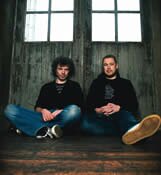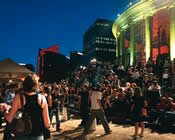Inflight Magazine of Brussels Airlines
Welcome to the Inflight Magazine of Brussels Airlines
Who’s the boss?
Belgium’s reputation as a hotbed for indie music is being gloriously upheld by its latest export, Milow. But as Nina Lamparski discovers, it can be tricky for the country’s independent artists to find the right path to take them to the top
 At one point, 2004 looked like the year that would bring fame and fortune to Jonathan Vandenbroeck, more commonly known by his stage name, Milow. At just 22, the fresh-faced musician had scored a final spot in Humo’s Rock Rally, Belgium’s largest contest for unsigned or independent local talents who haven’t released an official recording. Launched more than two decades ago by HUMO magazine, the biennial event holds cult status among aspiring artists because of its potential to kick-start careers. Notable names to ‘get their break’ after making it to the last round of the competition include Antwerp band DEUS (whose fans include Radiohead and R.E.M.), Ghent electro outfit Das Pop and pianist An Pierlé.
At one point, 2004 looked like the year that would bring fame and fortune to Jonathan Vandenbroeck, more commonly known by his stage name, Milow. At just 22, the fresh-faced musician had scored a final spot in Humo’s Rock Rally, Belgium’s largest contest for unsigned or independent local talents who haven’t released an official recording. Launched more than two decades ago by HUMO magazine, the biennial event holds cult status among aspiring artists because of its potential to kick-start careers. Notable names to ‘get their break’ after making it to the last round of the competition include Antwerp band DEUS (whose fans include Radiohead and R.E.M.), Ghent electro outfit Das Pop and pianist An Pierlé.
It’s easy to comprehend, then, why Milow had great expectations when he came fourth at Rock Rally; but these expectations were quickly dashed. “I hoped that agents would finally approach me for a deal, but there was no one on the Belgian circuit that wanted to work with me,” recalls the singer, who has since become one of the country’s hottest exports thanks to his 2008 cover of US rapper 50 Cent’s ‘Ayo Technology’. Milow continues: “It was frustrating, so in January 2006 I brought out my first album, The Bigger Picture, on my own label, Homerun Records.”
 His second single, ‘You Don’t Know’, proved a breakthrough hit on Belgian radio stations, remaining in the national charts for 42 weeks, and won the artist Best Song, Best New Artist and Best Music Video at the 2007 Music Industry Awards. But it was only after he performed his hypnotic, stripped down version of ‘Ayo Technology’ (which originally featured Justin Timberlake and Timbaland) during a live radio jam session that he finally conquered the European market. The cover received 20 million hits on YouTube alone, and has sold more copies than the original in countries from Austria to Sweden.
His second single, ‘You Don’t Know’, proved a breakthrough hit on Belgian radio stations, remaining in the national charts for 42 weeks, and won the artist Best Song, Best New Artist and Best Music Video at the 2007 Music Industry Awards. But it was only after he performed his hypnotic, stripped down version of ‘Ayo Technology’ (which originally featured Justin Timberlake and Timbaland) during a live radio jam session that he finally conquered the European market. The cover received 20 million hits on YouTube alone, and has sold more copies than the original in countries from Austria to Sweden.
His third album, Milow, is currently flying off the shelves in Germany, and is due for release in Canada this year. For Milow, though, the triumph didn’t come one second too soon. “I was 27 and had been writing songs for a long time,” he says. “I thought that something really needed to happen, which it did, thankfully. Now I’m going to ride the wave for as long as possible.”
Behind the scene
 The years of hardship, however, have left a slightly bitter taste regarding his compatriots. “I have mixed feelings towards the Belgian indie scene, largely because I was never really part of it,” Milow says. “At the same time, though, I believe that Belgium has one of the best musical educations in the world. We have very strong and critical music journalism, which sets the bar very high. Everyone who picks up a guitar here knows what they’re up against and that it’s not going to be enough to do something that’s already been done before.”
The years of hardship, however, have left a slightly bitter taste regarding his compatriots. “I have mixed feelings towards the Belgian indie scene, largely because I was never really part of it,” Milow says. “At the same time, though, I believe that Belgium has one of the best musical educations in the world. We have very strong and critical music journalism, which sets the bar very high. Everyone who picks up a guitar here knows what they’re up against and that it’s not going to be enough to do something that’s already been done before.”
It’s true that Antwerp, Ghent and Brussels have spawned numerous well-known artists over the past 30 years, predominantly in the alternative rock and techno/electro arenas. A heavily subsidised concert and festival circuit has helped artists such as Soulwax, Shameboy and Vaya Con Dios to catapult Belgium on to the international music stage and ensure the country’s reputation as a breeding ground for indie talent. And although some such musicians end up signing with a major record label – dEUS, for instance, are part of the Universal stable – this doesn’t necessarily harm their ‘indie’ tag, so long as fans don’t feel that they’ve given up their autonomy.
Still, Milow believes that his own interests are currently best served by cutting out the middleman. “For me, being an indie artist is all about the way you work,” he explains. “Before I had a lot of airplay, they called me an indie, folksy singer-songwriter. Now, they call my music ‘pop’ – but that’s just the label you get for being successful. I’m my own manager, I run my own company, and I maintain complete freedom. It’s funny when I go to a meeting and the agents are surprised to see me, and not some manager. And they don’t always like it, either…”
Best of both worlds?
 Milow’s story is an “exception” in the Belgian music industry, according to Kevin McMullan, spokesperson for top Brussels concert venue Ancienne Belgique (AB). From Lou Reed and Madness to The Cure, Ramones and Blondie, some of the world’s greatest bands have performed at this site, which also heavily promotes budding local talent. “Being a manager and a musician are two different skills and Milow is lucky to have both – most bands are useless at running their own show,” says McMullan, who, funnily enough, used to work for Universal prior to joining the AB. In his opinion, having a good agent in Belgium is vital. He explains: “Not many bands here are able to actually live off their music, so in a way they are forced to be indie, whether they like it or not. The place is so small that once you’ve brought out a first album and done, say, 20 gigs around Belgium, that’s it – there’s nowhere else to go. The internet helps, but I don’t think it’s enough to be on MySpace. We receive around 200 demos a week and it’s impossible to listen to them all, so we usually check out those recommended by agents or labels we trust.”
Milow’s story is an “exception” in the Belgian music industry, according to Kevin McMullan, spokesperson for top Brussels concert venue Ancienne Belgique (AB). From Lou Reed and Madness to The Cure, Ramones and Blondie, some of the world’s greatest bands have performed at this site, which also heavily promotes budding local talent. “Being a manager and a musician are two different skills and Milow is lucky to have both – most bands are useless at running their own show,” says McMullan, who, funnily enough, used to work for Universal prior to joining the AB. In his opinion, having a good agent in Belgium is vital. He explains: “Not many bands here are able to actually live off their music, so in a way they are forced to be indie, whether they like it or not. The place is so small that once you’ve brought out a first album and done, say, 20 gigs around Belgium, that’s it – there’s nowhere else to go. The internet helps, but I don’t think it’s enough to be on MySpace. We receive around 200 demos a week and it’s impossible to listen to them all, so we usually check out those recommended by agents or labels we trust.”
War of words
 In addition to being in an extremely competitive market, Belgian musicians face another tricky obstacle: the rigid language divide between the French-speaking and Flemish communities. “As a Flemish artist it’s hard to get gigs in Wallonia, and vice versa – it’s bizarre,” comments McMullan, adding that bands who do manage to achieve fame across the country, like DEUS or Zita Swoon, remain rare.
In addition to being in an extremely competitive market, Belgian musicians face another tricky obstacle: the rigid language divide between the French-speaking and Flemish communities. “As a Flemish artist it’s hard to get gigs in Wallonia, and vice versa – it’s bizarre,” comments McMullan, adding that bands who do manage to achieve fame across the country, like DEUS or Zita Swoon, remain rare.
So what, if any, advice is there for bands wanting to make it big in Belgium and beyond? “If you have the options of signing with a solid independent label in Paris or a commercial label here, I’d choose the first one,” says McMullan. “Remember that the Belgian office of a corporate record company is competing with its branches in other countries – and that makes it a lot harder for Belgian artists to go abroad. Also, the person running a label is as important as the company itself, so make sure you know who you’re dealing with, and that you like their way of doing business.”
Hot hangouts
Catch the latest indie talent at these vital Brussels venues
 Le Botanique
Le Botanique
Once housing the capital’s botanical garden, this neoclassical glass building is now an eclectic cultural hub featuring concerts, exhibitions and plays. www.botanique.be
Maison du Peuple
Set in the boho neighbourhood of Saint-Gilles, this funky café also serves as a stage for up-and-coming musicians. The programme features all genres, from pop/rock to jazz, hip-hop and reggae. www.maison-du-peuple.be
Les Ateliers Claus
One of the most ‘out there’ venues in Brussels, this is pure underground heaven. Expect anything from mad Tokyo punk to hardcore Belgian jazz. www.lesateliersclaus.com
Ancienne Belgique
A key cultural Flemish organisation, this is Brussels’ top concert venue both for big international acts and local independent bands. www.abconcerts.be
FR C’est qui le boss ?
La réputation de la Belgique comme foyer de la création musicale indépendante est largement confirmée par Milow, une de ses dernières gloires de l’exportation. Mais comme le constate Nina Lamparski, le parcours des artistes de la scène rock belge peut s’avérer tortueux. Pas facile d’arriver en droite ligne au sommet
Après des années de galère, Jonathan Vandenbroeck, plus connu sous son nom de scène Milow, est devenu l’une des vedettes les plus exportées du pays en 2008 avec sa reprise du morceau ‘Ayo Technology’, du rappeur américain 50 Cent. Son clip a reçu plus de 20 millions de visites rien que sur YouTube, et même si le chanteur a des sentiments mitigés vis-à-vis de la scène musicale belge, il est toutefois persuadé que son pays dispose d’un des meilleurs systèmes d’éducation du monde en matière de musique. Anvers, Gand et Bruxelles ont produit de nombreux artistes renommés au cours des 30 dernières années, comme DEUS par exemple, un produit de l’équipe d’Universal. Mais avoir un bon agent en Belgique est vital, explique Kevin McMullan, porte-parole de l’Ancienne Belgique, une des salles de concert les plus réputées de Bruxelles. « Le pays est tellement petit qu’après la sortie de votre premier album et une vingtaine de concerts sur la scène belge, c’est fini – il n’y a plus d’autres lieux où se produire. L’internet aide, mais je ne pense pas qu’il suffise d’exister sur MySpace. Nous recevons près de 200 démos chaque semaine et il est impossible de toutes les écouter, nous sélectionnons donc celles que nos agents ou les labels de confiance nous recommandent. »
Scènes Hots
Allez écouter les derniers talents de la scène musicale indépendante dans ces salles bruxelloises incontournables
Ancienne Belgique: organisation culturelle clé flamande, cette salle de concert de premier ordre accueille à Bruxelles tant les grands groupes internationaux que les formations indépendantes locales.
Le Botanique: ce bâtiment de verre néo-classique est un centre culturel éclectique proposant des concerts, des expositions et des spectacles de théâtre.
Maison du Peuple: ce café funky sert aussi de scène aux jeunes musiciens prometteurs.
Les Ateliers Claus: l’une des salles les plus branchées de Bruxelles, un vrai paradis « underground ».
NL Wie is de baas?
De reputatie van België als broeikas voor muziek in eigen beheer wordt nogmaals bevestigd door het nieuwste exportproduct, Milow. Maar Nina Lamparski ontdekt dat het voor de Belgische onafhankelijke artiesten niet eenvoudig is de juiste weg naar de top te vinden
Na jaren van tegenspoed werd Jonathan Vandenbroeck, beter bekend onder zijn artiestennaam Milow, in 2008 één van België’s populairste exportproducten met zijn cover van ‘Ayo Technology’ van de Amerikaanse rapper 50 Cent. De cover werd meer dan 20 miljoen keer alleen al op YouTube bekeken, maar alhoewel de zanger gemengde gevoelens heeft over de Belgische onafhankelijke scene, gelooft hij nog steeds dat zijn land één van de beste muziekopleidingen ter wereld heeft. Antwerpen, Gent en Brussel brachten de voorbije 30 jaar talrijke bekende artiesten voort – DEUS bijvoorbeeld zit bij Universal – maar een goede agent in België hebben is van groot belang, zegt Kevin McMullan, woordvoerder van de Brusselse concertzaal Ancienne Belgique. “België is zo klein dat eens je een eerste album hebt uitgebracht en je 20 optredens hebt gedaan, je rond bent – je kunt nergens meer heen. Het internet helpt, maar ik denk niet dat op MySpace zitten voldoende is. Wij krijgen ongeveer 200 demo’s per week en het is onmogelijk ze allemaal te beluisteren, dus we kijken meestal naar artiesten die ons werden aanbevolen door agenten of platenlabels waar we vertrouwen in hebben.”
Populaire plekken
Ga naar het nieuwste talent kijken op deze plekken in Brussel
Ancienne Belgique: dit is een belangrijke culturele Vlaamse organisatie en dé concertplek voor zowel internationale acts als lokale onafhankelijke groepen.
De Botanique: Dit neoklassieke glazen gebouw is een eclectisch cultureel centrum voor concerten, tentoonstellingen en voorstellingen.
Maison du Peuple: Dit funky café biedt ook een podium aan de muzikanten van de toekomst.
Les Ateliers Claus: Eén van de plekken waar de vinger aan de pols wordt gehouden in Brussel en de hemel op aarde voor liefhebbers van underground.
Leave a Reply
